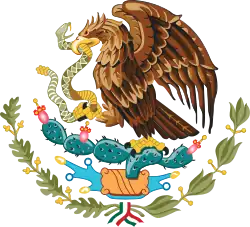Iran–Mexico relations
Iran–Mexico relations refers to the bilateral relations between Iran and Mexico. Both nations are members of the United Nations.
 | |
Iran |
Mexico |
|---|---|
History
.jpg.webp)
The first diplomatic contacts between Iran (then known as Persia) and Mexico took place in 1889. In May 1903, a Treaty of Friendship was signed between the two nations, however, it was later abolished and declared null by the Iranian government in May 1928 due to a technicality. In 1937, a new treaty was signed between the two nations and on 15 October 1964, formal diplomatic relations were established.[1] In May 1975, Shah Mohammad Reza Pahlavi paid a visit to Mexico meeting with Mexican President Luis Echeverría.[2] During the Shah's visit, he and President Echeverría discussed events transpiring in the Middle East at the time and both leaders agreed to strengthen bilateral relations between both nations and to open embassies in each nation's capitals, respectively.[2] In July 1975, Mexican President Luis Echeverría paid an official visit to Iran, the first and only visit by a sitting Mexican head of state.[3]
In January 1978, demonstrations intensified in Iran and a revolution soon followed. As a consequence, the monarchy was abolished and Shah Mohammad Reza Pahlavi and his family fled the country. After first traveling to Egypt, Morocco and the Bahamas seeking asylum, the Shah and his family arrived in Mexico in June 1979 where he was granted asylum. Fearing reprisals by the Iranian people and the government for its decision in allowing the Shah to seek asylum in Mexico; Mexico closed its embassy in Tehran. As a result, Iran downgraded its diplomatic representation in Mexico to that of a Chargé d'affaires. In October 1979, the Shah left Mexico and traveled to the United States for medical treatment where he soon succumbed to his illness and died in July 1980 in Egypt.[1][4]
In July 1992, Mexico re-opened its embassy in Tehran and in 1994, a joint Iran-Mexico conference was held in Tehran in order to increase bilateral relations. A second conference took place seven years later, in 2001 in Mexico City. In December 2014, an Iranian parliamentarian delegation visited Mexico to mark 50 years since both nations established diplomatic relations.[5]
In October 2016, an exhibition of “Pre-Hispanic Codices of Mexico” was opened in Tehran at the National Museum of Iran and in the National Library of Iran, respectively. These were 26 representative codices of the Aztecs, Mayan, Mixtec and Toltec cultures.[5]
High-level visits
High-level visits from Iran to Mexico
- Shah Mohammad Reza Pahlavi (1975)
- Foreign Minister Ali Akbar Velayati (1993)
- Foreign Vice-Minister Majid Takht-Ravanchi (2015)
- Foreign Minister Mohammad Javad Zarif (2016)
High-level visits from Mexico to Iran
- President Luis Echeverría (1975)
- Foreign Minister Fernando Solana Morales (1992)
- Foreign Undersecretary Carmen Moreno (2000)
- Foreign Undersecretary Carlos de Icaza (2014)
Bilateral agreements
Both nations have signed some bilateral agreements such as a Friendship Agreement (1903); Agreement on Scientific and Technical Cooperation (1975); Agreement on Cultural Cooperation (1975) and a Memorandum of Understanding to Strengthen Inter-Parliamentary Links (2014).[5]
Trade
Iran and Mexico have enjoyed increasingly close political and economic relations over the years, growing with the volume of bilateral trade and economic cooperation. The two countries aim to expand cooperation in several sectors, sharing science and technology, particularly in the oil industry. In 2018, total trade between both nations amounted to US$6 million.[6]
Iran's main exports to Mexico include: goods for the assembly or manufacture of aircraft or airplanes, marble, carpets, parts for turbochargers and superchargers. Mexico's main exports to Iran include: scissors, chewing gum, razors, distilled water, toothbrushes, including brushes for dentures, wheat, tubers roots and vegetable materials of the species used mainly in the manufacture of brooms, brushes or brushes, sesame oil and sodium salt.[5] Mexico is Iran's principal trading partner in Latin America.[7]
Resident diplomatic missions
- Iran has an embassy in Mexico City.[8]
- Mexico has an embassy in Tehran.[9]
References
- History of diplomatic relations between Mexico and Iran (in Spanish)
- Shah of Iran visits Mexico (in Spanish)
- El viaje presidencial por tres continentes (in Spanish)
- The Shah's Health: A Political Gamble
- Bilateral relations between Mexico and Iran (in Spanish)
- Mexican Ministry of the Economy: Iran (in Spanish)
- "Trade between Iran and Latin-America (in Spanish)". Archived from the original on 2014-07-14. Retrieved 2014-07-09.
- Embassy of Iran in Mexico City
- Embassy of Mexico in Tehran

